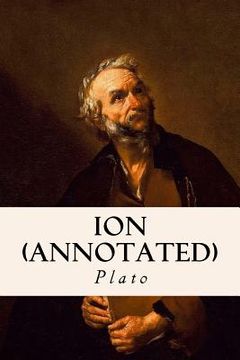Reseña del libro "Ion (annotated) (en Inglés)"
The Ion is the shortest, or nearly the shortest, of all the writings which bear the name of Plato, and is not authenticated by any early external testimony. The grace and beauty of this little work supply the only, and perhaps a sufficient, proof of its genuineness. The plan is simple; the dramatic interest consists entirely in the contrast between the irony of Socrates and the transparent vanity and childlike enthusiasm of the rhapsode Ion. Translated by Benjamin Jowett. In Plato's Ion Socrates discusses with the titular character, a professional rhapsode who also lectures on Homer, the question of whether the rhapsode, a performer of poetry, gives his performance on account of his skill and knowledge or by virtue of divine possession. It is one of the shortest of Plato's dialogues. Ion has just come from a festival of Asclepius at the city of Epidaurus, after having won first prize in the competition. Socrates engages Ion in a philosophical discussion. Ion admits when Socrates asks, that his skill in performance recitation is limited to Homer, and that all other poets bore him. Socrates finds this puzzling, and sets out to solve the "riddle" of Ion's limited expertise. He points out to Ion that art critics and judges of sculpture normally do not limit themselves to judging the work of only a single artist, but can criticize the art no matter who the particular artist. Socrates deduces from this observation that Ion has no real skill, but is like a soothsayer or prophet in being divinely possessed: "For a poet is a light and winged and sacred thing, and is unable ever to indite until he has been inspired and put out of his senses, and his mind is no longer in him: every man, whilst he retains possession of that, is powerless to indite a verse or chant an oracle. Seeing then that it is not by art that they compose and utter so many fine things about the deeds of men- as you do about Homer-but by a divine dispensation, each is able only to compose that to which the Muse has stirred him, this man dithyrambs, another laudatory odes, another dance-songs, another epic or else iambic verse; but each is at fault in any other kind. For not by art do they utter these things, but by divine influence; since, if they had fully learnt by art to speak on one kind of theme, they would know how to speak on all. And for this reason God takes away the mind of these men and uses them as his ministers, just as he does soothsayers and godly seers, in order that we who hear them may know that it is not they who utter these words of great price, when they are out of their wits, but that it is God himself who speaks and addresses us through them."[534b-d] Socrates offers the metaphor of a magnet to explain how the rhapsode transmits the poet's original inspiration from the muse to the audience. He says that the god speaks first to the poet, then gives the rhapsode his skill, and thus, gods communicate to the people. Socrates posits that Ion must be out of his mind when he acts, because he can weep even though he has lost nothing, and recoil in fear when in front of an admiring audience. Ion says that the explanation for this is very simple: it is the promise of payment that inspires his deliberate disconnection from reality. Ion says that when he looks at the audience and sees them weeping, he knows he will laugh because it has made him richer, and that when they laugh, he will be weeping at losing the money.

